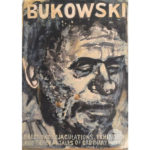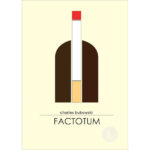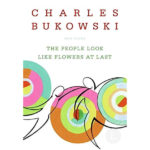Hollywood is the final novel by Charles Bukowski, it was written in the late 1980s and it was published in 1989. The novel follows the story of Henry Chinaski, a fictionalized version of the author himself, as he navigates his way through the seedy underbelly of Hollywood and the film industry.
BOOK INFO
version: CLASSIC, EBOOK, AUDIOBOOK
number of pages: 228
literary movement: COUNTERCULTURE
literary genre: SEMI-AUTOBIOGRAPHY
1st edition: 1989
years of writing: late 1980s
SUMMARY
The novel is set in the mid-20th century, and like many of Bukowski’s works, it is known for its raw, unvarnished, and often brutal honesty, as well as its darkly humorous and often cynical look at life. The novel is a continuation of the themes explored in Post Office and Women such as the struggles of the working-class, poverty, and the search for meaning in a meaningless world. The novel also explores the theme of Hollywood and the film industry, and how the characters, especially Chinaski, have to find ways to survive in this harsh and often hostile world.
The novel’s style is also worth mentioning, it is written in a simple, direct, and unadorned manner, which reflects the gritty realism of the story and the characters. Bukowski’s writing is known for its raw, unvarnished, and often brutal honesty, and this style is evident in Hollywood as well. The book is also known for its darkly humorous and often cynical look at life, which adds depth and complexity to the story and the characters.
Furthermore, the novel’s setting, Hollywood and the film industry, is also worth discussing as it serves as a metaphor for the larger society. The Hollywood and the film industry represent the superficiality, superficiality, and superficiality of the society. Chinaski’s experiences in Hollywood reflect the struggles of the individual against the system, and the novel uses the setting to comment on the larger societal issues.
In conclusion, Hollywood is a novel that explores several complex and meaningful themes, including alienation, the search for meaning, poverty, societal expectations, the film industry, the human condition, survival, and the American Dream. The novel uses a simple, direct and unadorned style, dark humor, and a powerful setting to create a powerful and memorable story that is considered a classic of modern literature.
Another important aspect of Hollywood is the theme of disillusionment and the American Dream. The novel explores how the characters, especially Chinaski, have to confront the harsh reality that the American Dream is often a false promise, and how this realization leads to feelings of disillusionment and disappointment. The novel also explores the theme of the individual versus the system, and how the characters have to navigate the complex and often oppressive nature of Hollywood and the film industry.
The novel also explores the theme of personal growth and self-discovery. Through Chinaski’s experiences in Hollywood, the novel shows how the characters have to learn and grow in order to survive in this harsh and often hostile world. The novel also explores the theme of the human condition, and how the characters have to find ways to cope with the struggles and hardships of life.
The novel also features a cast of colorful and eccentric characters, which adds depth and complexity to the story and the themes. The characters include Chinaski’s friends, acquaintances, and co-workers, all of whom are portrayed in a way that is relatable and true to life, with all their flaws and imperfections.
MAIN CHARACTERS
Henry Chinaski
A fictionalized version of the author himself. Chinaski is portrayed as a man who is struggling to make a living working dead-end jobs and trying to make a name for himself as a writer. He is also portrayed as a man who is searching for something more in his life, and is constantly trying to find a way to escape the monotony and alienation that surround him.
Jan
Chinaski’s first love. She is portrayed as a woman who is searching for something more in her life, and Chinaski’s relationship with her is a reflection of his own search for meaning and purpose.
Wanda
Chinaski’s second love. She is portrayed as a woman who is searching for something more in her life, and Chinaski’s relationship with her is a reflection of his own search for meaning and purpose.
Tammie
Chinaski’s third love. She is portrayed as a woman who is searching for something more in her life, and Chinaski’s relationship with her is a reflection of his own search for meaning and purpose.
Chinaskiˈs Agent
A more successful and less sympathetic character.
Chinaskiˈs Mother
A character who has a small but important role in the book.
The main character’s relationships with these characters are central to the plot and themes of the novel. They serve as a reflection of Chinaski’s own struggles and search for meaning, and their interactions with each other help to flesh out the novel’s themes.
People just weren’t interesting. Maybe they weren’t supposed to be. But animals, birds, even insects were. I couldn’t understand it.
CHARLES BUKOWSKI
TOP 10 POINTS
- Hollywood explores the theme of alienation and how it affects relationships, Chinaski’s relationships with women are often characterized by a sense of disconnection and isolation, which reflects the alienation that is present in the modern world.
- The novel explores the theme of the search for meaning and how it is closely related to relationships, as Chinaski’s search for meaning and purpose is often intertwined with his relationships with women.
- The novel explores the theme of poverty and the struggle to make ends meet, as Chinaski is portrayed as a man who is struggling to survive on his low wages and is often forced to live in poverty.
- The novel explores the theme of societal expectations and gender roles, Chinaski’s relationships with women are often defined by societal expectations, and the novel explores how these expectations can lead to disappointment and dissatisfaction.
- The novel explores the theme of disillusionment and the American Dream, the novel explores how the characters, especially Chinaski, have to confront the harsh reality that the American Dream is often a false promise, and how this realization leads to feelings of disillusionment and disappointment.
- The novel explores the theme of the individual versus the system, and how the characters have to navigate the complex and often oppressive nature of Hollywood and the film industry.
- The novel explores the theme of personal growth and self-discovery, through Chinaski’s experiences in Hollywood, the novel shows how the characters have to learn and grow in order to survive in this harsh and often hostile wo
- The novel explores the theme of the human condition, and how the characters have to find ways to cope with the struggles and hardships of life.
- The novel features a cast of colorful and eccentric characters, which adds depth and complexity to the story and the themes.
- The novel uses a simple, direct, and unadorned style, dark humor, and a powerful setting to create a powerful and memorable story that is considered a must-read for those interested in the works of Charles Bukowski. The setting, Hollywood and the film industry, serves as a metaphor for the larger society and the novel uses it to comment on larger societal issues.
Overall, Hollywood is a powerful and memorable novel that explores complex and meaningful themes, and it is considered a classic of modern literature. The novel’s setting, Hollywood and the film industry, serves as a metaphor for the larger society, and the novel uses the setting to comment on larger societal issues. The novel also uses a simple, direct, and unadorned style, dark humor, and a powerful setting to create a powerful and memorable story that is considered a must-read for those interested in the works of Charles Bukowski.
MOVIE ADAPTATION
Barfly is a 1987 film directed by Barbet Schroeder, starring Mickey Rourke and Faye Dunaway. The movie is based on the life of Charles Bukowski, and it depicts his days as a struggling writer living in Los Angeles in the 1970s.
The film follows the character of Henry Chinaski (played by Rourke), a heavy drinker and womanizer who spends most of his time in bars, writing and drinking. Henry meets Wanda Wilcox (played by Dunaway), a beautiful and lonely woman who works as a bartender, and the two form an unlikely bond. As they get to know each other, their relationship is tested by their mutual addiction to alcohol and their own self-destructive tendencies.
Throughout the movie, we see Henry’s struggles as a writer and his complicated relationships with other bar regulars, including his rival Eddie and his friend Tully. The film portrays the gritty and raw side of Los Angeles, with scenes taking place in dive bars and seedy motels.
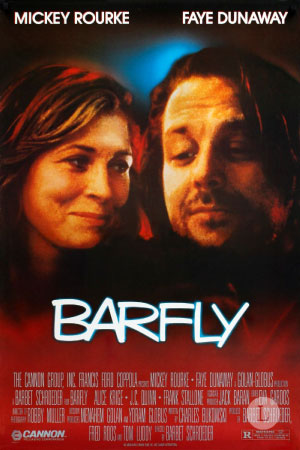
ABOUT WRITER
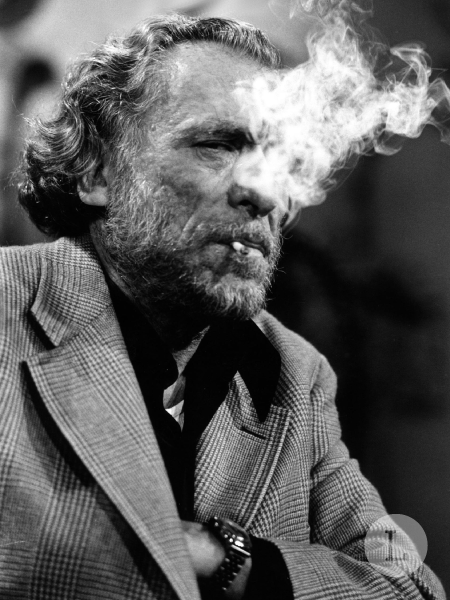
Charles Bukowski was a German-American poet, novelist, and short story writer who is considered one of the most important and influential writers of the 20th century. He was born in Andernach, Germany on August 16, 1920, and immigrated to the United States with his family when he was two years old. The family settled in Los Angeles, where Bukowski grew up and spent most of his life.

